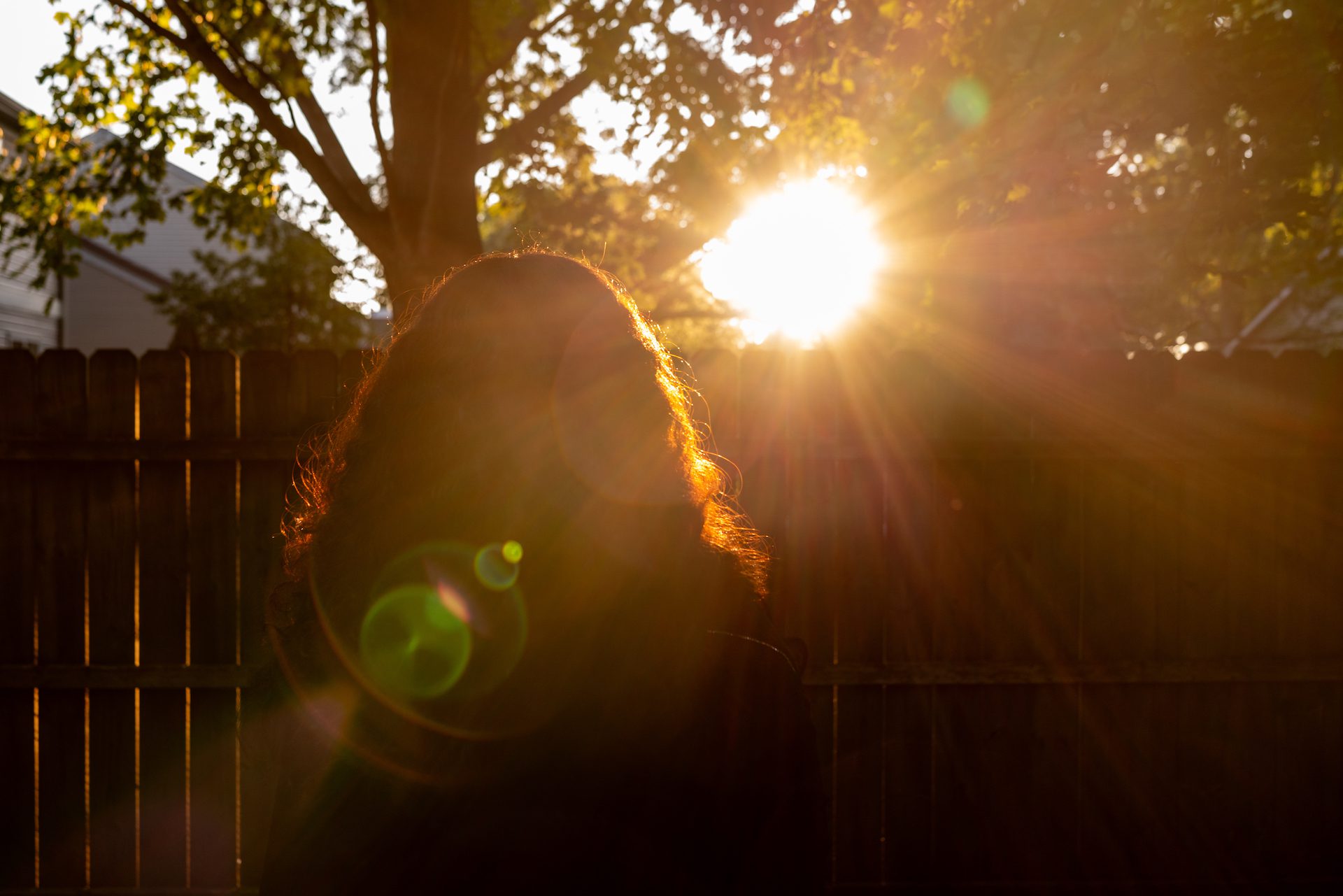 Camilla Forte/Borderless Magazine/Catchlight Local/Report for America
Camilla Forte/Borderless Magazine/Catchlight Local/Report for AmericaDespite navigating uncertainties about her future, Ada says she’s found healing by sharing her story.
Editor’s note [9/23]: *Ada has chosen to use a pseudonym to protect her safety and privacy. Borderless Magazine has also chosen not to publish identifying information such as Ada’s school for personal safety reasons. For questions, please contact us at [email protected].
Three years ago, in a small coffee shop in suburban Illinois, Ada* learned about the possibility of attending a four-year university as an undocumented student. Over coffee, she spoke with a director of undocumented student resources about scholarships, grants and other financial aid opportunities at her future school.
“That was the first time I ever heard someone say that they could support me in that way,” Ada said. “[It made me] cry because usually people don’t really get that.”
More than 2.5 million people in the U.S. are undocumented individuals, like Ada, who came to the U.S. as children, also known as “Dreamers.”
News that puts power under the spotlight and communities at the center.
Sign up for our free newsletter and get updates twice a week.
Ada is also a recipient of Deferred Action for Childhood Arrivals (DACA), a program created by the Obama administration to grant temporary deportation protection and access to work permits for people who came to the U.S. as children.
But in recent months, many DACA recipients have faced uncertainty over their legal status and lives in the U.S. due to the Trump administration’s mixed messaging on the program’s future.
In an interview with NBC News’ Meet the Press in December last year, President Donald Trump shared his willingness to work with Democratic legislators to find a path forward for DACA, acknowledging that DACA recipients were brought to the U.S. at a young age.
“We have to do something about the Dreamers,” Trump said at the time. “…I will work with the Democrats on a plan.”
However, the Trump administration’s hard push for widespread immigration enforcement has resulted in the deportation and detainment of DACA recipients nationwide. Recently, federal agencies have also made them ineligible for federal benefits such as health care and targeted universities offering financial aid for DACA recipients.
In July, Tricia McLaughlin, assistant secretary for public affairs at the Department of Homeland Security (DHS), urged DACA recipients to self-deport and said DACA does not grant someone legal status or protect them from deportation, according to NPR.
Ada has lived in Illinois for more than twenty years. Since receiving DACA protections at 16, she’s joined advocacy groups for undocumented students and been inspired to work with other young organizers to fight for the rights of undocumented immigrants.
Borderless Magazine spoke with Ada about her advocacy journey and how she gained the confidence to share her story.
An uncertain future
I wasn’t thinking about my future in high school. I have DACA, so I knew I could get a job. But I also knew that it would be difficult to go to college because I’m not eligible for federal student aid.
People from low-income backgrounds already struggle with going to college because of the costs, and I couldn’t even apply for federal financial aid.
There was so much uncertainty.
I barely graduated from high school because I felt hopeless about my future. I didn’t know I had general anxiety and major depressive disorder until later. But I didn’t do well in my classes. Then, I went to community college from 2019 until 2022.
Read More of Our Coverage
Around that time, DACA was in the courts after President Donald Trump attempted to end the program in his first term. My intro to government class professor spoke about the program and the court cases. I remember him saying something like, “Oh, there might be people in this class that might be affected by this.” He didn’t know about my DACA status, but I freaked out after that class.
I told my friend and an advisor that I was worried about DACA. I was crying in the advisor’s office, but she told me people were out there fighting for us, which calmed me down.
After struggling in high school, community college was a second opportunity. I was more motivated about my future because I started researching on Google. I was just searching, “Can DACA people do this? Can DACA people do that?”
I saw a lot of people with DACA who had the careers they wanted and were going to college. I was still confused, but seeing them gave me hope.
Finding support systems
When I was looking for a school to finish my college degree, I found a four-year university with a resource center for undocumented students.
One of my high school teachers gave me the phone number to reach the resource center’s director, so I contacted her.
We met at a coffee shop, and I brought my parents with me. I told her I wanted to study political science and become a lawyer, and she shared some of the college’s resources.
She helped guide me with scholarships, grants and other resources to help me pay for school.
Our meeting was mostly about helping me, which made me emotional. I cried because it was the first time someone supported me in this way.
Many universities will recruit you by promising support and resources. But sometimes there isn’t that support during your educational experience, especially for first-generation students.
I’m not only first-generation, but also undocumented.
If you want undocumented students to thrive, you have to have someone there to support them.
A community of undocumented students
In the fall of 2022, I transferred to a public university. My major was communications with an emphasis on advocacy and public speaking. I also double-minored in Latin American studies and political science.
One of the first organizations I became involved in was a student organization that advocates for undocumented and mixed-status students. I was the social media chair and later the vice president.
That was the first time I had a space where other people had similar stories to mine.
I found a community that understood me through that student organization. Before joining the group, when I would talk with friends about being undocumented, they would feel sympathy and empathy toward me — but they wouldn’t really understand what I was going through.
But being in an organization with other undocumented people, I knew that when I talked about things, they would get it.
Learning to tell her story
Something we did a lot in that student organization was storytelling. We had an event called Coming Out of the Shadows, inspired by the national Coming Out of the Shadows events that happened in the past, with the LGBTQ+ community coming out.
It’s a big event for the community, with nearly 300 attendees.
For us, it was about coming out with your status. As someone who is undocumented, you’re often told not to share your status because it can be dangerous. But this movement was about sharing your story openly.
One story that I remember the most was from a Nigerian student. I was really glad he shared his story because a lot of people assume just because you’re undocumented, you’re Latino. But immigration affects everyone.
Undocumented is not an ethnicity.
I wrote a poem about my journey the year I shared my story.
“Although caged and with clipped wings, my desire to take flight doesn’t stop. I am not alone in my cage, there are many others just like me who dream of one day being free.”
That was the first time I shared my story with a big audience. I was so nervous that I took off my glasses so I wouldn’t have to see people.
After sharing my story, I felt good. I don’t know if it was adrenaline or euphoria. A lot of people came up to me after and shared that they really enjoyed my story or that they saw themselves in my story, even people I didn’t know.
I’m glad I was able to share my personal experience, and that it impacted someone or made someone more knowledgeable about the struggles of undocumented people.
It can be healing to share your story. A stat is just a stat — a fact, a number. What sticks with people are stories and hearing about people’s struggles.
In a story, you share your voice. That’s the beauty I found in it. Sharing stories can change people’s minds.
The current political landscape
I’ve been feeling a lot of uncertainty over the last few months. Social media just gets to you.
In my area, there were constant reports that U.S. Immigration and Customs Enforcement (ICE) was in the neighborhood. So back then — and I still do this — I go on my lunch break and just look to see if ICE is in town. It’s part of my routine because my parents are undocumented.
It’s hard because people are sharing these Know Your Rights trainings and information, but these rights are from before this administration. We’re telling people this is their constitutional right, but then those rights are being violated every day with no consequences. It seems like no one really cares because we don’t have legal status.

Sometimes, I just watch TV. That’s how I escape. But praying has also helped me.
My family is Catholic, so prayer is a big part of our lives. It helps me be less anxious and more relaxed. It’s what I lean on.
Katrina Pham is Borderless Magazine’s audience engagement reporter. Email Katrina at [email protected].
This story was produced using Borderless Magazine’s collaborative as-told-to method. To learn how we make stories like these, check out our as-told-to visual explainer.

